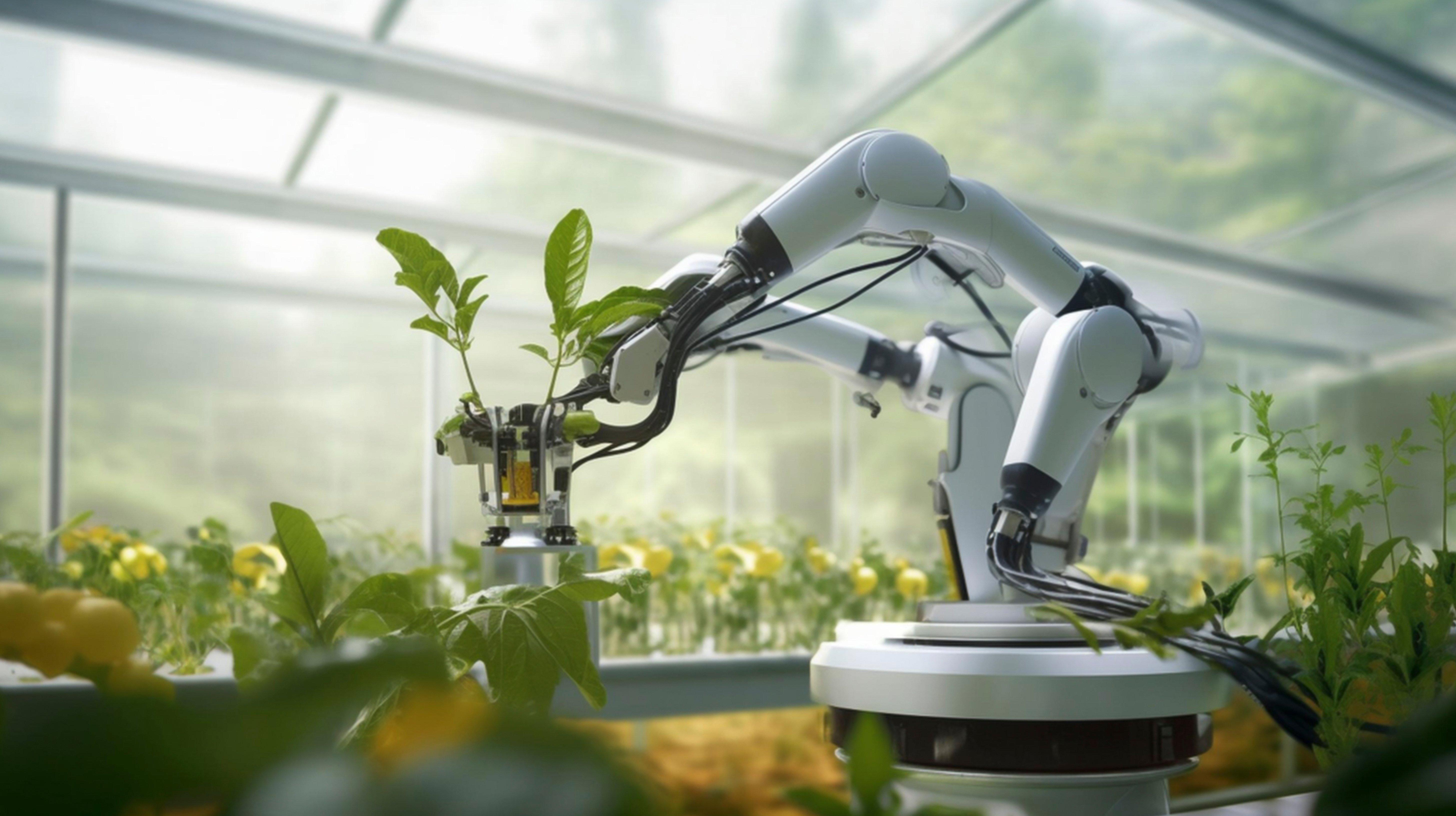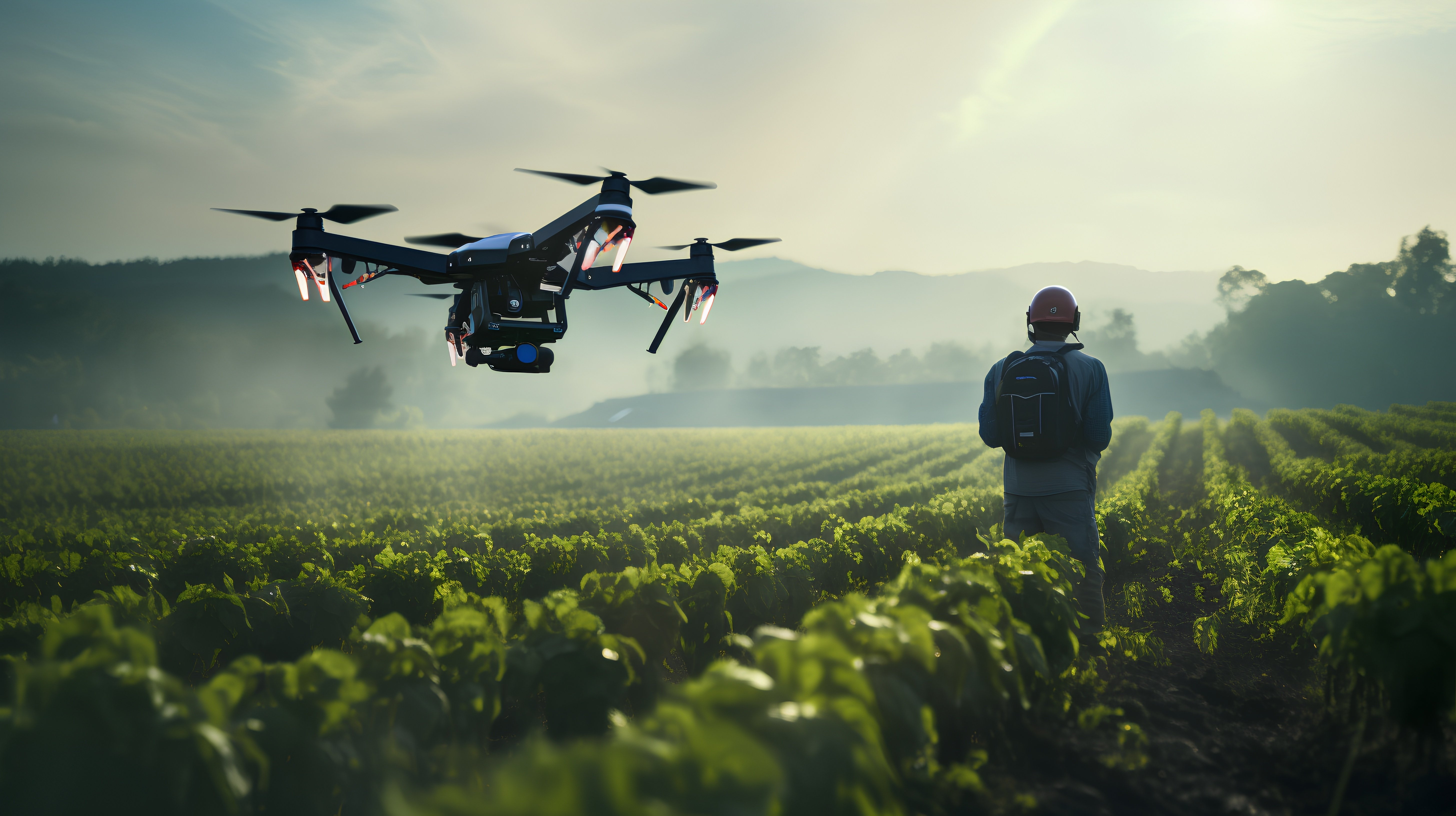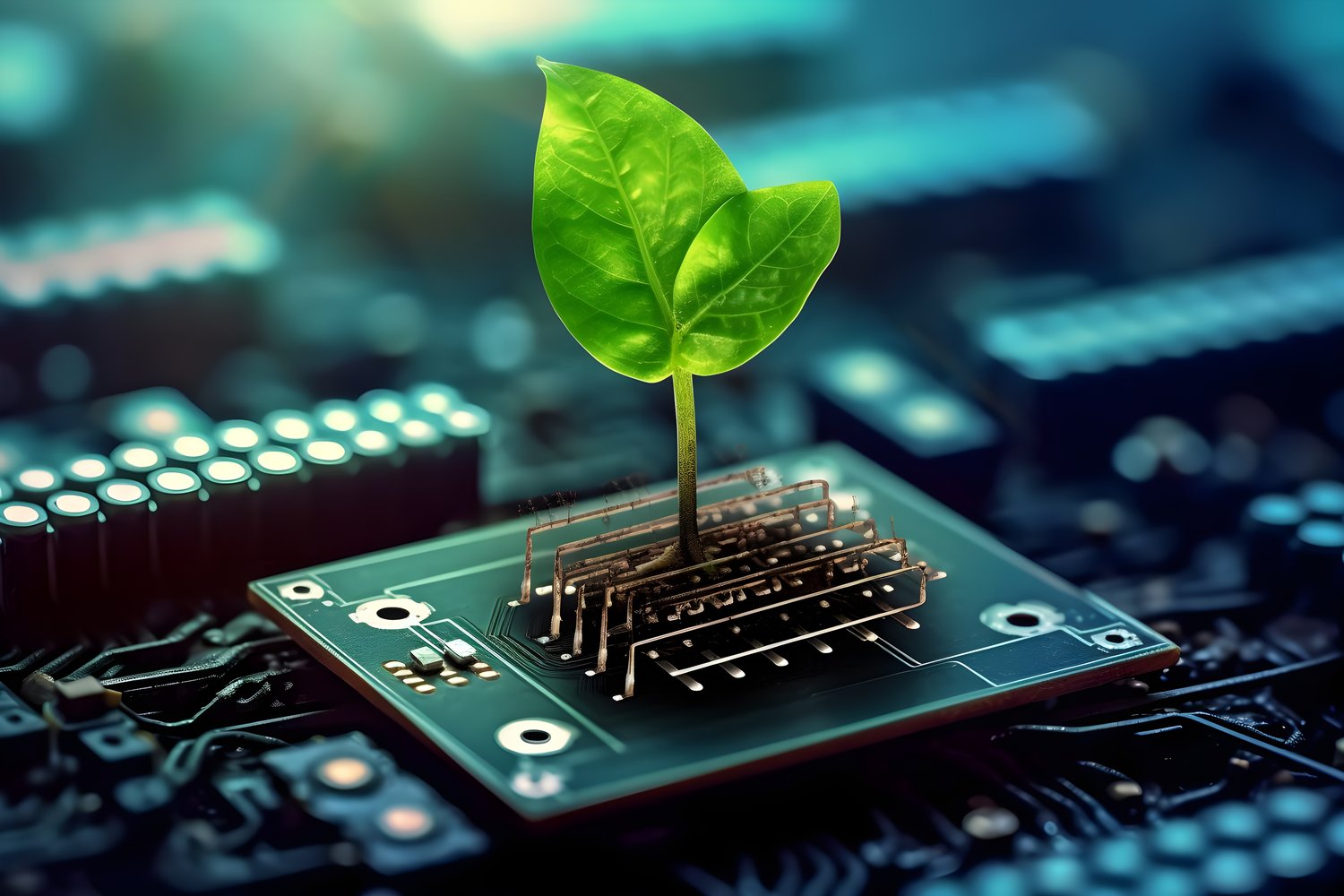Sustainability is more than ever at the forefront of technical innovation; it will participate in making those necessary transformative changes toward a more climate-conscious, sustainability-oriented industry. The fate of future generations depends on how much poise those companies will bring to the current situation; and that's why we're showcasing the main trends of sustainability, Greetech, and Agtech in 2024.
All resources used to create this piece are available at the end of the article, and NOT throughout.
Section 1: Unveiling Agtech's Global Impact - Deloitte's Projections

Deloitte's insights paint a compelling picture of AgTech's imminent transformative role, forecasting a global revenue opportunity of $18 billion in 2024, boasting a 19% CAGR between 2020 and 2024.
1.1 IoT Endpoints on the Rise
By 2024, the installed base of IoT endpoints tailored for precision farming, livestock management, and equipment tracking is set to surge by 50%, reaching nearly 300 million—an astounding growth from 200 million in 2022.
1.2 Tackling Agricultural Challenges Head-On
AgTech emerges as a solution to pressing challenges, such as climate change, water scarcity, rising costs, and inefficient methods. It offers the promise of improved crop yields, efficient resource use, and sustainable agrifood production.
1.3 Environmental Impact and Cost-Efficiency
In collaboration with the Environmental Defense Fund, Deloitte's study highlights that precision agriculture tech alone can abate 9.8 gigatons of CO2e emissions by 2050, saving farmers $40 billion to $100 billion by 2030.
1.4 Navigating Global Food Security
With the global population set to hit 10 billion by 2050, AgTech becomes indispensable. It addresses challenges in the face of supply disruptions, geopolitical issues, and a looming food crisis. Efficiency coupled with environmental ethics are the key differentiator here.
1.5 Technological Revolution in Agriculture
AgTech solutions promise to revolutionize agriculture across various domains. From hydroponics for higher yields to major tech and telecom investments in AI-based cultivation and IoT-enabled smart farming, technology is set to redefine how we produce food sustainably.
In subsequent sections, we delve into specific AgTech applications, illustrating how these technologies not only enhance efficiency and productivity but also contribute to sustainable agricultural practices.
Section 2: AgTech's Role in Climate Change Mitigation

The realm of Agricultural Technologies (AgTech) within the cleantech ecosystem emerges as a formidable force in mitigating global climate change emissions. As we delve into the landscape, several pivotal categories unfold, each carrying profound implications for the year ahead.
2.1 Cell-Based Meat: A Revolution in the Making
A revolutionary concept, cell-based meat, offers a promising solution to environmental challenges associated with traditional livestock farming. The prospect of growing a burger in a petri dish presents an opportunity to eliminate the ecological toll of conventional meat production, from methane emissions to land and water usage.
While the technology remains largely in laboratories despite substantial investments, experts foresee a transformative shift in the industry's landscape.
- Isha Datar, Executive Director of New Harvest, notes the industry's progression, acknowledging the challenges as a necessary step. The influx of funds has spurred positive developments, with countries investing public money and universities establishing labs.
- Comparisons with other disruptive technologies, such as lab-grown diamonds, suggest that despite the current hurdles, cellular meat is on a trajectory towards market acceptance and eventual dominance.
2.2 Farms Embrace Automation: Navigating Labor Shortages
Incorporating technology on farms faces challenges, as farmers, traditionally cautious adopters, assess risk carefully. Labour shortages, a prevalent concern, are anticipated to drive automation initiatives in the coming year.
As farmers seek to optimize with fewer passes over fields, companies like Bonsai Robotics, investing in AI, provide solutions that not only enhance soil health but also contribute to the financial well-being of farms.
2.3 Precision Fermentation: A Leap Forward in AgTech
Precision fermentation stands out as a category potentially farther along the innovation cycle. Its flexibility has enabled the creation of essential ingredients for plant-based foods, like dairy and egg proteins, facilitating the growth of the plant-based alternatives market.
This utilitarian space is expected to witness continued growth, serving as a linchpin for advancements in other AgTech fields.
2.4 Biomass Fermentation: Microbes as the Product
Biomass fermentation, where microbes themselves become the product, finds application in startups like Quorn and Meati, contributing to the alternative protein space. A noteworthy development on the horizon is the potential shift towards fungi packaging, presenting a sustainable alternative to plastic packaging—a prospect gaining traction amid increasing global considerations for single-use plastic bans.
2.5 Large-Scale Agriculture and GMOs: Challenges and Evolution
The dominance of GMO monocrops faces scrutiny, with the industry showing signs of maturity.
While no significant shifts are anticipated in the immediate future, the advent of cellular meats could be a catalyst for change. As the demand for GMO crops to feed livestock diminishes, large-scale agriculture may undergo a transformation, reclaiming arable land for natural ecosystems.
In the year ahead, AgTech is poised to shape the future of sustainable agriculture, addressing climate challenges, and offering innovative solutions to age-old problems. The path may present challenges, but the potential benefits suggest a transformative journey towards a more sustainable and environmentally conscious agricultural sector.
Section 3: Bridging AgTech and Sustainability with Generative AI

The intersection of Agricultural Technologies (AgTech) and generative AI holds the promise of addressing complex challenges in sustainable agriculture. Leveraging the power of artificial intelligence, these technologies aim to revolutionize farming practices, enhance efficiency, and contribute to environmental conservation. This section explores the synergies between AgTech and generative AI, showcasing their potential to shape a more sustainable future for agriculture.
3.1 Smart Farming and AI Integration
The marriage of AgTech and generative AI is evident in the concept of smart farming, where advanced sensors, drones, and AI algorithms collaborate to optimize agricultural processes.
By analysing data on weather patterns, soil conditions, and crop health, AI-driven systems offer real-time insights, enabling farmers to make informed decisions for resource-efficient and sustainable farming.
As outlined in Deloitte's projections, the integration of IoT endpoints in precision farming aligns with the capabilities of generative AI. These technologies work in tandem to streamline operations, reduce resource wastage, and enhance overall agricultural productivity. The collective impact of IoT and AI extends beyond conventional farming methods, marking a significant leap toward sustainable agrifood production.
3.2 AI-Enabled Crop Monitoring for Environmental Conservation
Generative AI contributes to environmental conservation in agriculture by providing advanced crop monitoring capabilities. AI algorithms analyse satellite imagery, drone footage, and sensor data to monitor crop growth, detect diseases, and optimize irrigation. This not only enhances crop yields but also minimizes the use of pesticides and water, aligning with sustainability goals.
The collaboration between AgTech and generative AI in crop monitoring exemplifies a proactive approach to addressing challenges such as climate change and resource scarcity. The predictive nature of AI models allows farmers to take pre-emptive measures, ensuring the long-term health of crops while minimizing environmental impact.
3.3 Autonomous Agricultural Machinery and Energy Efficiency
Automation, a key component of both AgTech and generative AI, addresses labour shortages in agriculture and contributes to energy efficiency.
Farms embracing automation, powered by AI algorithms, optimize the use of machinery, reducing fuel consumption and emissions. This not only aligns with sustainability objectives but also reflects the changing landscape of agriculture as it embraces technological advancements.
The utilization of autonomous agricultural machinery, guided by generative AI, holds the potential to transform large-scale farming practices. By optimizing routes, monitoring energy usage, and minimizing environmental impact, these technologies pave the way for a more sustainable and efficient agricultural sector.
Funding Greentech for A Better Future: Fuse Capital’s mission

Fuse Capital stands as a pivotal player in the financial landscape, specializing in sourcing alternative financing deals tailored for industry leaders and emerging Tech SMEs at the forefront of AgTech, Greentech, and Sustainability-oriented AI solutions.
Recognizing the unique financial needs of companies driving innovation in these sectors, Fuse Capital offers a diverse range of financial instruments, including Venture Debt, Private Debt, and M&A solutions. With ticket sizes ranging from £2-25 million, the firm is well-positioned to support businesses in securing the necessary capital for growth and development.
What sets Fuse Capital apart is its ability to structure asset-based lending solutions, complemented by favourable warrants, providing clients with flexible and strategic financial arrangements.
This tailored approach ensures that businesses in AgTech, Greentech, and Sustainability-oriented AI can access the capital required to scale, innovate, and make a lasting impact on the industries that shape our sustainable future.
If you're a founder in this sector, don't hesitate to consult our dedicated pages or book a meeting with one of our debt advisors.
Conclusion: A Confluence of Innovations for a Sustainable Future
As we navigate the intricate landscapes of AgTech and sustainability-driven generative AI, it becomes evident that their confluence holds the key to a more sustainable future in agriculture. Deloitte's projections highlight the financial opportunities in AgTech, while the insights from the Sustainability Project underscore the urgency of environmental conservation.
In the year ahead, the collaboration between AgTech and generative AI is poised to address not only the immediate challenges of climate change, labour shortages, and resource inefficiency but also contribute to the overarching goal of global food sustainability.
The road may present challenges, including ethical considerations and data privacy concerns, but the potential benefits suggest a transformative journey toward a more environmentally conscious agricultural sector.
Sources:
- Deloitte.technology-media-and-telecom-predictions/2024/agricultural-technology-predictions
- Bold Predictions in AgTech and Cellular Ag for 2024 - CleanTechnica
- 5 Emerging AgTech Industry Trends (2024) (explodingtopics.com)
- 20 Agtech Companies & Startups On The Rise In 2024 (explodingtopics.com)
- Generative AI and Sustainability: Green Tech Innovations in 2024 - TechBullion
- What are the top sustainability trends for 2024? (economist.com)

.png)